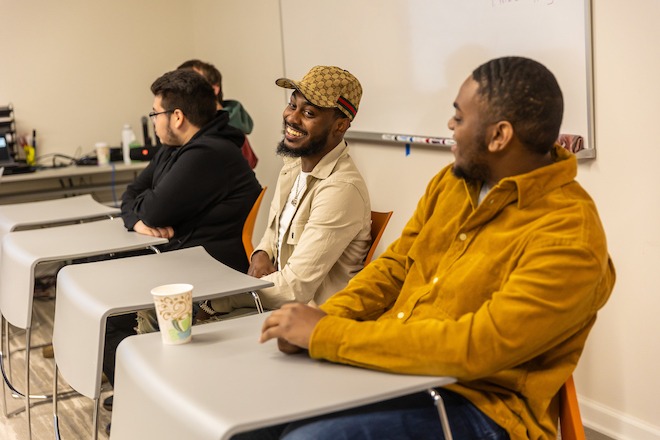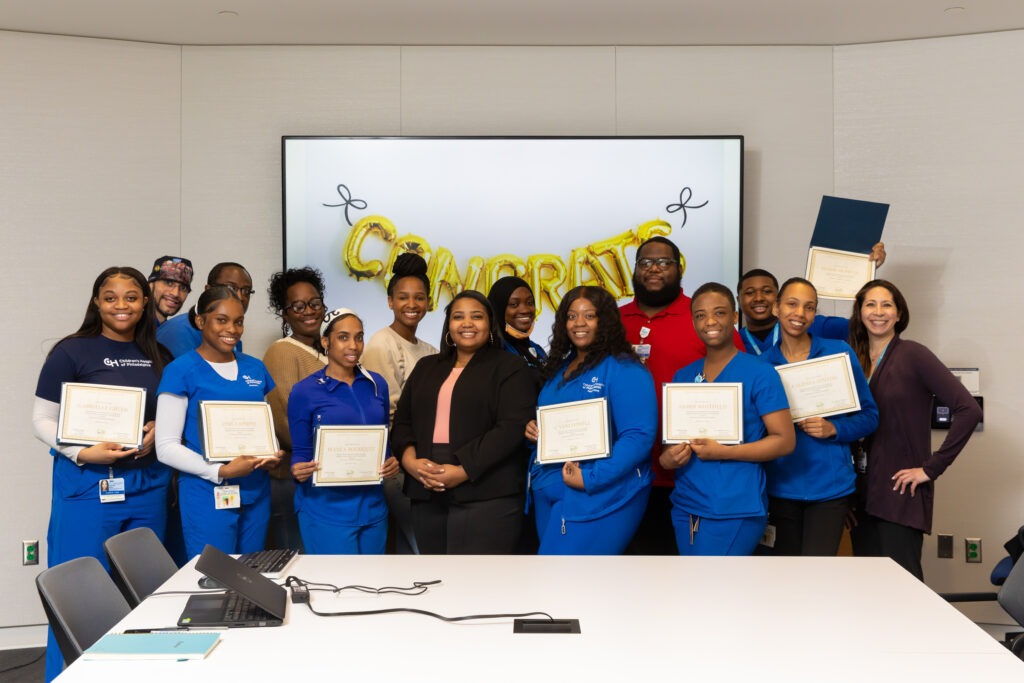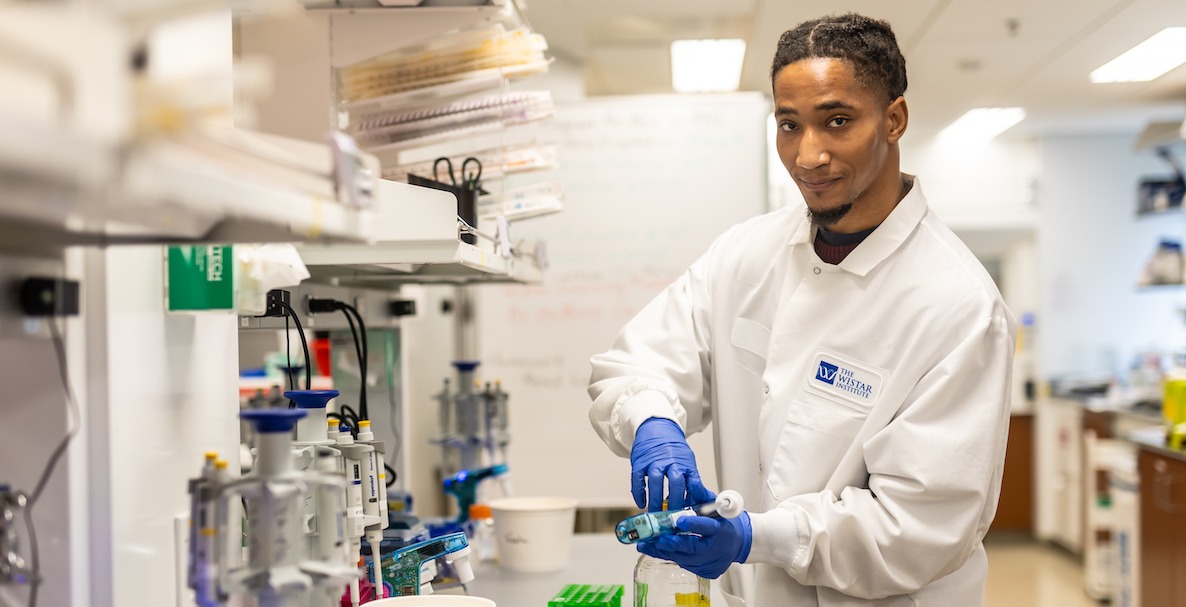Parkside resident Tyler Wood started her career as an IT specialist for the military. But by 2018, she had spent two years out of the workforce, staying home to care for her children. She felt she was ready to go back to work, but was nervous about interviewing with companies after such a long absence.
“I didn’t have the skills that I needed to successfully go through a job interview and land the job,” she recalls.
Wood knew a few friends and neighbors who had found jobs through the West Philadelphia Skills Initiative, (WPSI) a job recruitment and training program run by the University City District. The program connects and prepares Philadelphians for jobs with local companies. She signed up, and says, “It helped me tremendously. We had mock interviews. It gave everyone a morale boost we needed.”
Wood soon found a position as a crew member with a landscaping company. That brought her back into the workforce while she waited to hear back from IT jobs she applied to through WPSI. She was working in IT again within a couple months.
The 13-year-old program has placed 1,775 people in stable, lucrative jobs over its lifespan. In February of 2024, the Skills Initiative received a $4 million grant from a donor whose name you might recognize: philanthropist MacKenzie Scott, former wife of Amazon tycoon Jeff Bezos. This month, they rebranded to become the Skills Initiative to reflect their growth beyond West Philly and into the rest of the city.
Economic development and job growth
In hindsight, it seems natural a billionaire philanthropist like Scott would want to support the Skills Initiative. The organization touts an impressive record. Begun in 2011 as a scrappy, neighborhood job training program with just seven graduates, by 2023, they’d become a machine that ran 19 different recruitment and training programs.
The process of receiving the gift was shrouded in secrecy. Last year, a group of consultants representing an anonymous charity reached out to the Skills Initiative to schedule an informational interview.
“They never said MacKenzie Scott’s name,” Cait Garozzo, executive director of the Skills Initiative, says. “Then it was a phone call one afternoon in our office where we learned that [they thought] we were impressive, and that MacKenzie Scott was really impressed with the work that we are doing.”
And that work, it bears repeating, is impressive. Skills Initiative partners with dozens of employers, including Children’s Hospital of Philadelphia, Penn Medicine and the Naval Surface Warfare Center. This year they expect to run 25 recruitment and training programs or “cohorts.” Next year, between 27 and 29. Each cohort typically represents between 12 and 20 jobs, depending on an employer’s needs.

The Initiative expanded beyond West Philly during the 2019 to 2020 session, partnering with the Philadelphia Industrial Development Corporation to bring a cohort to employers in the Navy Yard. They’ve also built partnerships with major employers, like SEPTA, that are headquartered in Center City, and employ people in multiple neighborhoods.
“Quickly, employers from around the city began to knock on our doors,” says Matt Bergheiser, president of the University City District. “[And] there are hundreds of people knocking down our door every time we post a training cohort at Skills Initiative. We want to be able to serve all of them.”
At first blush, it might seem odd that a business improvement district (BID) is involved in a workforce training program. BIDs — which support initiatives like street cleaning programs, recruitment of retailers and other efforts that make neighborhoods tidy, safe and vibrant — are more often accused of creating wealth among businesses — and leaving lower-income residents out of the equation.
It’s a dynamic the University City District (UCD) was guilty of in its early years. UCD succeeded in helping businesses grow and flourish, but many nearby residents remained in poverty. Bergheiser didn’t want to leave residents behind in favor of business owners. So, they partnered with the University of Pennsylvania on a pilot program training people for lab jobs. A few grants later, and the Skills Initiative had its first cohort.
“We took a step back, and we said, How can you invest in a place without investing in the talent in that place?” Bergheiser says. “That was really the motivating force behind the formation of the Skills Initiative.”
Getting a job through the Skills Initiative
Each Skills Initiative cohort begins with employers approaching the University City District about potential job openings. The University City District then acts as an intermediary between the employer and people searching for jobs by sending out recruitment emails to a database of about 10,000 local applicants. They screen resumes — sometimes as many as 900 for a single job — conduct interviews and offer training for specific skills employers may need.
“If the program involves math intensive work, we will do an assessment to see where folks’ math abilities are to make sure that they align with the program,” Garozzo says. “If an employer has 20 openings, we will bring 20 people through our program to the interview day. If they have 16 openings, we’ll bring 16 people through our program. We are in the business of connecting people directly to those opportunities, not of having folks compete with each other.”
The program Wood participated in lasted between four to six weeks and helped her polish her interviewing, networking and other job readiness and soft skills, like improving confidence and how to tell personal stories in an interview setting. Notably, she got to go onsite with the company she applied for to see what the job would be like, to confirm the role was the right fit for her.
“You were able to get a feel of what your day-to-day would be if you worked at this job, which I felt was really cool,” Wood says. “I absolutely loved my time there. The time flew by. I made great friends and connections.”
Partnering with employers
On the employer side, the process is similarly intensive. The Skills Initiative isn’t just looking for any jobs; they’re seeking good jobs. Graduates make $22.07 per hour on average. MIT’s living wage calculator says an adult needs to work full time at a rate of $22 per hour in order to live comfortably. Pennsylvania’s minimum wage is $7.25 per hour. The Skills Initiative estimates that employers have paid $115,915,100 in wages to graduates over the life of the program.
Wages aren’t the only factor they consider. Garozzo says the team evaluates and ranks job quality based on factors like scheduling consistency, opportunities for career growth and a host of others. The Urban Institute notes that workforce development programs are most effective at getting people out of poverty when they help prepare them for well-paying, stable jobs, rather than just finding one-off employment opportunities. Higher wages can have positive knock-on effects for families, including improving health and child development.
More than 85 percent of Skills Initiatives applicants are Black; the poverty rate among Black Philadelphians is 24.5 percent.

Iovance Biotherapeutics was one of the Skills Initative’s earliest partners in the Navy Yard. Jamie Crawford, the company’s vice president of commercial manufacturing, says the program has helped the company fill biotechnician roles.
Before expanding to South Philly, the Skills Initiative helped recruit and train biotechnicians for a program with Penn, so they could bring on more people qualified to administer Covid tests. Crawford thought that program was similar to Iovance’s needs. The company takes white blood cell samples from patients and uses them to create treatments that fight cancer.
Iovance started talking with the Skills Initiative in the second part of 2021 and launched their first cohort of 16 applicants in 2022. Of those, 10 were offered permanent positions at the end of the training program, and three received offers at Iovance outside of the manufacturing team.
“They tailored it uniquely to our manufacturing needs,” Crawford says. “I would highly recommend the Skills Initiative to companies that engage in commercial manufacturing for the life science industry.”
What’s new for the Skills Initiative
The Skills Initiative hopes to use Scott’s money to help sustain its current growth. Their strategy is proven, so they’re doubling down, rather than pursuing new initiatives. They’re also planning to work with participants to identify other areas of critical need, like housing. And they’re hiring for two positions, which will bring their staff to 15 people this year.
Bergheiser sees room for the organization to expand on three fronts: geography, industries they serve, and career growth. During the early days of the program, they wanted to help people get their first job. Now, they’re offering career counseling and resume support services to help people grow their careers.
Wood has benefited from this additional support. The Skills Initiative helped her secure her first job after time away from the workforce, and then it helped her land a second in IT and her current position as office manager for Councilmember Jamie Gauthier.
“[The Skills Initiative] has literally changed my life. I don’t feel that I would be where I am right now if I didn’t go through the program,” Wood says.
Employers who have used Skills Initiative to find workers are all in on supporting its growth. Iovance hopes to start doing between two and three Skills Initiative cohorts per year going forward. The company recently completed its second cohort of 13 people. Iovance hired nine of them. Many people from the first cohort are still with the company.
“They’re successful with their model,” Crawford says. “Some individuals come to the program with a high school degree. Others may have an associates or bachelors degree … Some are returning to work after taking time off to raise a family. I think that the breadth of those backgrounds makes the group stronger as a whole because it brings a lot of perspectives.”
 Every Voice, Every Vote funds Philadelphia media and community organizations to expand access to civic news and information. The coalition is led by The Lenfest Institute for Journalism. Lead support for Every Voice, Every Vote in 2024 and 2025 is provided by the William Penn Foundation with additional funding from The Lenfest Institute for Journalism, Comcast NBC Universal, The John S. and James L. Knight Foundation, Henry L. Kimelman Family Foundation, Judy and Peter Leone, Arctos Foundation, Wyncote Foundation, 25th Century Foundation, and Dolfinger-McMahon Foundation.
Every Voice, Every Vote funds Philadelphia media and community organizations to expand access to civic news and information. The coalition is led by The Lenfest Institute for Journalism. Lead support for Every Voice, Every Vote in 2024 and 2025 is provided by the William Penn Foundation with additional funding from The Lenfest Institute for Journalism, Comcast NBC Universal, The John S. and James L. Knight Foundation, Henry L. Kimelman Family Foundation, Judy and Peter Leone, Arctos Foundation, Wyncote Foundation, 25th Century Foundation, and Dolfinger-McMahon Foundation.
![]() MORE ON CREATING JOBS IN PHILLY
MORE ON CREATING JOBS IN PHILLY





